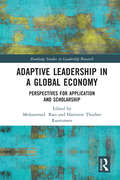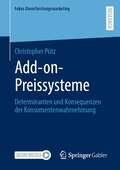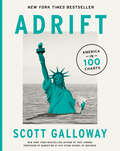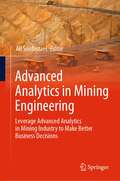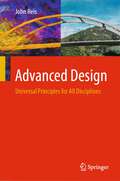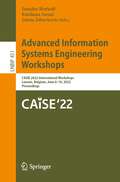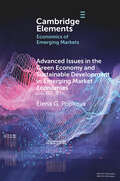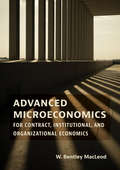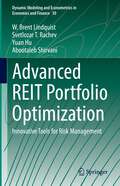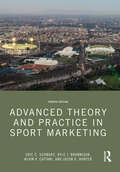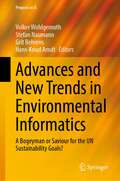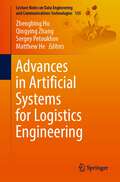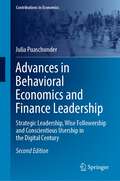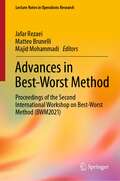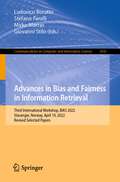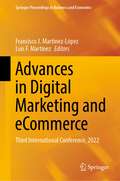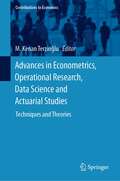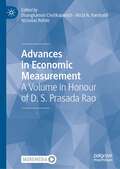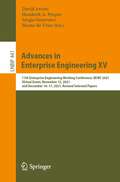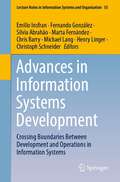- Table View
- List View
Adam Smith’s America: How a Scottish Philosopher Became an Icon of American Capitalism
by Glory M. LiuThe unlikely story of how Americans canonized Adam Smith as the patron saint of free marketsOriginally published in 1776, Adam Smith&’s The Wealth of Nations was lauded by America&’s founders as a landmark work of Enlightenment thinking about national wealth, statecraft, and moral virtue. Today, Smith is one of the most influential icons of economic thought in America. Glory Liu traces how generations of Americans have read, reinterpreted, and weaponized Smith&’s ideas, revealing how his popular image as a champion of American-style capitalism and free markets is a historical invention.Drawing on a trove of illuminating archival materials, Liu tells the story of how an unassuming Scottish philosopher captured the American imagination and played a leading role in shaping American economic and political ideas. She shows how Smith became known as the father of political economy in the nineteenth century and was firmly associated with free trade, and how, in the aftermath of the Great Depression, the Chicago School of Economics transformed him into the preeminent theorist of self-interest and the miracle of free markets. Liu explores how a new generation of political theorists and public intellectuals has sought to recover Smith&’s original intentions and restore his reputation as a moral philosopher.Charting the enduring fascination that this humble philosopher from Scotland has held for American readers over more than two centuries, Adam Smith&’s America shows how Smith continues to be a vehicle for articulating perennial moral and political anxieties about modern capitalism.
Adam Smith’s System: A Re-Interpretation Inspired by Smith's Lectures on Rhetoric, Game Theory, and Conjectural History (Palgrave Studies in the History of Economic Thought)
by Andreas Ortmann Benoît WalraevensInspired by his lectures on rhetoric and by game theory, this book provides a new interpretation of Adam Smith’s system of thought. It highlights its coherence through the identification of three reasoning routines and a meta-reasoning routine throughout his work on languages, rhetoric, moral sentiments, self-command, and the nature and causes of the wealth of nations. The identification of these reasoning routines allows the authors to uncover a hitherto poorly understood deep structure of Smith’s work and to explain its main characteristics. How these routines emerged in Smith’s early research on the principles of the human mind is also traced. This book sheds new light on Adam Smith and his work, highlighting his sophisticated understanding of strategic interaction in all things rhetorical, moral, and economic. It will be relevant to students and researchers interested in the history of ideas, the history of economic thought, game theory, Enlightenment studies, and rhetoric.
Adaptive Leadership in a Global Economy: Perspectives for Application and Scholarship (Routledge Studies in Leadership Research)
by Mohammed RaeiWith the entire world experiencing the global pandemic and its aftermath, VUCA (Volatile, Uncertain, Complex, and Ambiguous) conditions have never been more extreme and the need for adaptive leadership never more urgent. But how is adaptive leadership applied outside Western cultures? How can it be taught through leadership development programs? Which tools enhance its practice and its teaching? How does adaptive leadership relate to other key theories and practices? This volume answers these questions and more as it illustrates how adaptive leadership practices address some of the world’s most pressing challenges-political and cultural division, remote work, crisis management-across a variety of sectors. Adaptive leadership has been explained as a key leadership approach for dealing with adaptive, as distinguished from technical or predictable, problems, especially prevalent in complex environments. However, adaptive leadership scholarship has suffered from a lack of conceptual clarity and casual application of its core concepts. It remains solidly Western in its prescriptions. This book will expand readers’ understanding of adaptive leadership and its potential to solve local and global adaptive challenges and will explore its relevance and application to cultures outside the United States. Aiming to increase conceptual clarity about adaptive leadership to enhance future scholarship and application and illustrate novel approaches and perspectives, this book will be of interest to researchers, academics, practitioners, and students in the fields of leadership, strategy, and organizational studies.
Add-on-Preissysteme: Determinanten und Konsequenzen der Konsumentenwahrnehmung (Fokus Dienstleistungsmarketing)
by Christopher PützChristopher Pütz untersucht in drei Forschungsprojekten, wie Konsumenten Add-on-Preissysteme wahrnehmen, bei denen Anbieter neben einem Basisprodukt optionale kostenpflichtige Zusatzleistungen vermarkten. Die Ergebnisse der empirischen Studien offenbaren eine Reihe von Determinanten, welche die Wahrnehmung von Add-on-Preissystemen beeinflussen und welche Konsequenzen daraus resultieren. Basierend auf diesen Erkenntnissen leitet der Autor Implikationen für die Wissenschaft und die Unternehmenspraxis ab.
Additive Manufacturing (AM): Entwicklung eines Informationsversorgungskonzepts zur Unterstützung des AM-Produktentstehungsprozesses
by Dominik MorarDie Fertigungstechnologie Additive Manufacturing (AM) erfreut sich zunehmender Beliebtheit und steigender Verbreitung in der produzierenden Industrie. Neben produktbezogenen Anwendungspotenzialen eröffnet AM weitreichende Möglichkeiten, die die Kollaboration in der Produktentstehung betreffen. So eignet sich AM zur orts- und zeitunabhängigen Produktion in Wertschöpfungsnetzwerken. Hierfür ausschlaggebend ist der hohe Digitalisierungsgrad im Produktentstehungsprozess. Folglich wird AM als eine Schlüsseltechnologie der digitalen Transformation produzierender Unternehmen verstanden. Zur proaktiven Gestaltung dieser Transformation kommt der Nutzung der Ressource Information eine zentrale Rolle zu. Das Ziel dieser Arbeit ist die Konzeption einer bedarfsgerechten Informationsversorgung für den Entstehungsprozess von AM-Produkten durch eine angemessene Integration von Informationssystemen. Das entwickelte Informationsversorgungskonzept basiert auf einer Exploration unter AM-Anwendern. Den Kern des Konzepts bildet das digitale AM-Produktmodell, das eine AM-gerechte Struktur für den Informationsaustausch im AM-Produktentstehungsprozess bildet.
Additive Manufacturing for Plastic Recycling: Efforts in Boosting A Circular Economy (Sustainable Manufacturing Technologies)
by Rupinder SinghThis book provides a comprehensive and up-to-date discussion of breakthroughs on additive manufacturing for plastic material recycling to boost a circular economy. It offers new ideas of combining/hybridizing processing methods that work as a source of information for manufacturers in making new and strategic product development plans. Additive Manufacturing for Plastic Recycling: Efforts in Boosting a Circular Economy provides a critical, comprehensive, methodological, and strong state-of-the-art work on the processing of thermoplastic and thermosetting along with new directions and applications. It describes the common and hybrid approaches of recycling processes and includes theoretical and practical ideas of combining/hybridizing processing methods with the use of fused deposition modelling, which is one of the low-cost additive manufacturing techniques. The book also discusses mechanical twin-screw extrusion followed by case studies for developing hybrid composite structures for biomedical and structural applications. Recent innovations in melt processing for recycling and the fundaments, process parameters investigations, and applications for new product development are also presented. This book is a first-hand reference source of information for academic scholars and commercial manufacturers for making strategic development plans for new product development.
Adrift: America in 100 Charts
by Scott GallowayFrom bestselling author, CNN+ host of No Mercy, No Malice, and NYU business school professor Scott Galloway comes an urgent examination of the future of our nation – and how we got here. <p><p>We are only just beginning to reckon with our post-pandemic future. As political extremism intensifies, the great resignation affects businesses everywhere, and supply chain issues crush bottom lines, we’re faced with daunting questions: Is our democracy under threat? How will Big Tech change our lives? What does job security look like for me? America is on the brink of massive change—change that will disrupt the workings of our economy and drastically impact the financial backbone of our nation: the middle class. <p><p>In Adrift, Galloway looks to the past —from 1945 to present day—to explain just how America arrived at this precipice. Telling the story of our nation through 100 charts, Galloway demonstrates how crises such as Jim Crow, World War II, and the Stock Market Crash of 2008, as well as the escalating power of technology, an entrenched white patriarchy, and the socio-economic effects of the pandemic, created today’s perfect storm. Adrift attempts to make sense of it all, and offers Galloway’s unique take on where we’re headed and who we’ll become, touching on topics as wide-ranging as online dating to minimum wage to the American dream. Just as in 1945 and 1980, America is once again a nation at a crossroads. This time, what will it take for our nation to keep up with the fast and violent changes to our new world? <p> <b>New York Times Bestseller</b>
Advanced Analytics in Mining Engineering: Leverage Advanced Analytics in Mining Industry to Make Better Business Decisions
by Ali SoofastaeiIn this book, Dr. Soofastaei and his colleagues reveal how all mining managers can effectively deploy advanced analytics in their day-to-day operations- one business decision at a time.Most mining companies have a massive amount of data at their disposal. However, they cannot use the stored data in any meaningful way. The powerful new business tool-advanced analytics enables many mining companies to aggressively leverage their data in key business decisions and processes with impressive results.From statistical analysis to machine learning and artificial intelligence, the authors show how many analytical tools can improve decisions about everything in the mine value chain, from exploration to marketing.Combining the science of advanced analytics with the mining industrial business solutions, introduce the “Advanced Analytics in Mining Engineering Book” as a practical road map and tools for unleashing the potential buried in your company’s data.The book is aimed at providing mining executives, managers, and research and development teams with an understanding of the business value and applicability of different analytic approaches and helping data analytics leads by giving them a business framework in which to assess the value, cost, and risk of potential analytical solutions. In addition, the book will provide the next generation of miners – undergraduate and graduate IT and mining engineering students – with an understanding of data analytics applied to the mining industry. By providing a book with chapters structured in line with the mining value chain, we will provide a clear, enterprise-level view of where and how advanced data analytics can best be applied. This book highlights the potential to interconnect activities in the mining enterprise better. Furthermore, the book explores the opportunities for optimization and increased productivity offered by better interoperability along the mining value chain – in line with the emerging vision of creating a digital mine with much-enhanced capabilities for modeling, simulation, and the use of digital twins – in line with leading “digital” industries.
Advanced Design: Universal Principles for All Disciplines
by John ReisThis book is about design. Everybody does design, from artists to engineers, from interior designers to industrial designers. We design our days and we design our lives. This book presents the three universal activities that everyone uses, no matter who they are or what they do. These three activities are 1.) clarify an ambiguous project, 2.) generate ideas, and 3.) select one idea for implementation. This book also presents how the psychology of design impacts our effectiveness with each of these three activities, from creativity through decision making, intuition through analysis, and cognitive enhancement through design biases. Although the examples provided in this book primarily target the diverse disciplines of art (painting) and engineering, they can be easily understood and adapted by designers in any discipline.This book helps advanced design students and working professionals in any discipline to understand why and when the basic design principles they were taught work or do not work and, as a result, improve their design effectiveness.
Advanced Information Systems Engineering Workshops: CAiSE 2022 International Workshops, Leuven, Belgium, June 6–10, 2022, Proceedings (Lecture Notes in Business Information Processing #451)
by Jennifer Horkoff Jelena Zdravkovic Estefania SerralThis book constitutes the thoroughly refereed proceedings of the international workshops associated with the 34th International Conference on Advanced Information Systems Engineering, CAiSE 2022, which was held in Leuven, Belgium, during June 6-10, 2022.The workshops included in this volume are: · BC4IS: Second International Workshop on Blockchain for Information Systems· ISESL: Second International Workshop on Information Systems Engineering for Smarter Life· KET4DF: 4th International Workshop on Key Enabling Technology for Digital Factories They reflect a broad range of topics and trends ranging from blockchain technologies via digital factories, ethics, and ontologies, to the agile methods for business and information systems. The 11 full papers and 1 short paper presented in this book were carefully reviewed and selected from 23 submissions.
Advanced Issues in the Green Economy and Sustainable Development in Emerging Market Economies (Elements in the Economics of Emerging Markets)
by Elena G. PopkovaThis Element goes far beyond economic theory. It will also be of interest to representatives of the environmental sciences due to its focus on the “green” economy and sustainable development. It will also be interesting to the representatives of the social sciences, as it takes into account the peculiarities of emerging market economies. Learning from the COVID-19 pandemic makes this Element interesting from a health economics perspective.
Advanced Microeconomics for Contract, Institutional, and Organizational Economics
by W. Bentley MacLeodA graduate textbook on microeconomics, covering decision theory, game theory, and the foundations of contract theory, with a unique focus on the empirical.This graduate-level text on microeconomics, covering such topics as decision theory, game theory, bargaining theory, contract theory, trade under asymmetric information, and relational contract theory, is unique in its emphasis on the interplay between theory and evidence. It reviews the microeconomic theory of exchange &“from the ground up,&” aiming to produce a set of models and hypotheses amenable to empirical exploration, with particular focus on models that are useful for the study of contracts, institutions, and organizations. It explores research that extends price theory to the exchange of commodities when markets are incomplete, discussing recent developments in the field. Topics covered include the relationship between theory and evidence; decision theory as it is used in contract theory and institutional design; game theory; axiomatic and strategic bargaining theory; agency theory and the class of models that are considered to constitute contract theory, with discussions of moral hazard and trade with asymmetric information; and the theory of relational contracts. The final chapter offers a nontechnical review that provides a guide to which model is the most appropriate for a particular application. End-of-chapter exercises help students expand their understanding of the material, and an appendix provides brief introduction to optimization theory and the welfare theorem of general equilibrium theory. Students are assumed to be familiar with general equilibrium theory and basic constrained optimization theory.
Advanced REIT Portfolio Optimization: Innovative Tools for Risk Management (Dynamic Modeling and Econometrics in Economics and Finance #30)
by Svetlozar T. Rachev Yuan Hu W. Brent Lindquist Abootaleb ShirvaniThis book provides an investor-friendly presentation of the premises and applications of the quantitative finance models governing investment in one asset class of publicly traded stocks, specifically real estate investment trusts (REITs). The models provide highly advanced analytics for REIT investment, including: portfolio optimization using both historic and predictive return estimation; model backtesting; a complete spectrum of risk assessment and management tools with an emphasis on early warning systems, risk budgeting, estimating tail risk, and factor analysis; derivative valuation; and incorporating ESG ratings into REIT investment. These quantitative finance models are presented in a unified framework consistent with dynamic asset pricing (rational finance). Given its scope and practical orientation, this book will appeal to investors interested in portfolio optimization and innovative tools for investment risk assessment.
Advanced Theory and Practice in Sport Marketing
by Eric C. Schwarz Jason D. Hunter Kyle J. Brannigan Kevin P. CattaniNow in a fully revised and updated fourth edition, Advanced Theory and Practice in Sport Marketing is still the only textbook to introduce key theory and best practice in sport marketing at an advanced level. The book goes beyond the introductory sport marketing course by exploring advanced marketing theories related to topics such as ethics and social responsibility, international marketing, marketing research and information systems, data analytics, consumer behavior, product and logistics management, branding and brand management, sales management, promotions, social media and networking, destination marketing, and evaluating performance. New to this edition are sections on pricing structures and strategies, experiential marketing, new digital marketing communications and technology, emotional intelligence in sport marketing, and social entrepreneurship. This is also one of the first books to consider the challenges of sports marketing in a post-COVID world. Every chapter contains extended case studies and theory-to-practice insights from marketing professionals around the world. This is an essential textbook for courses on sport marketing, and invaluable recommended reading for any general course on sport business, sport management, sport development, or marketing. Ancillary resources include a test bank, PowerPoint slides, and a master course syllabus.
Advances and New Trends in Environmental Informatics: A Bogeyman or Saviour for the UN Sustainability Goals? (Progress in IS)
by Grit Behrens Volker Wohlgemuth Stefan Naumann Hans-Knud ArndtThis book is an outcome of the 35th International Conference EnviroInfo 2021, held at Humboldt University Berlin, organized by the technical committee for Environmental Informatics of the German Informatics Society. It presents a selection of papers that describe innovative scientific approaches and ongoing research in environmental informatics and the emerging field of environmental sustainability, promoted and facilitated by the use of information and communication technologies (ICT). The respective articles cover a broad range of scientific aspects including advances in core environmental informatics-related technologies such as earth observation, environmental modelling, big data and machine learning, robotics, smart agriculture and food solutions, renewable energy-based solutions, optimization of infrastructures, sustainable industrial processes and citizen science, as well as applications of ICT solutions intended to support societal transformation processes toward the more sustainable management of resource use, transportation and energy supplies. A special focus lies on the question how environmental informatics can contribute to achieving the United Nations Sustainable Development Goals. Given its scope, the book is essential reading for scientists, experts and students in these fields of research.
Advances in Artificial Systems for Logistics Engineering (Lecture Notes on Data Engineering and Communications Technologies #135)
by Sergey Petoukhov Matthew He Zhengbing Hu Qingying ZhangThe book comprises high-quality refereed research papers presented at the Second International Conference on Artificial Intelligence and Logistics Engineering (ICAILE2022), held in Kyiv, Ukraine, on February 20–22, 2022, organized jointly by the National Technical University of Ukraine "Igor Sikorsky Kyiv Polytechnic Institute," Wuhan University of Technology, Nanning University, National Aviation University, and the International Research Association of Modern Education and Computer Science. The topics discussed in the book include state-of-the-art papers in artificial intelligence and logistics engineering. It is an excellent source of references for researchers, graduate students, engineers, management practitioners, and undergraduate students interested in artificial intelligence and its applications in logistics engineering.
Advances in Behavioral Economics and Finance Leadership: Strategic Leadership, Wise Followership and Conscientious Usership in the Digital Century (Contributions to Economics)
by Julia PuaschunderThis book explores human decision-making heuristics. The monograph studies how nudging and winking can help citizens to make rational choices and governments to create choice architectures that aid in stabilizing markets and flourishing society. By applying the behavioral economics approach to political outcomes, it demonstrates how economics can be employed for personal benefits but also foster the greater societal good. A review of the current literature on human decision-making advantages and failures in Europe and North America opens the book. A wide range of nudges and winks is presented that aid to curb the harmful consequences of human decision-making fallibility. Awareness of mental heuristics and biases in the finance domain is strengthened in order to understand how to nudge people to benefit from economic markets but also help governments to stabilize economies in providing strategic market communication. The author also proposes concrete leadership and followership directives on nudging in the digital age. This book appeals to scholars and policy makers interested in rational decision-making. The behavioral perspective features the strategic use of nudging and winking in the digital age.The second revised and expanded edition offers the newest insights on behavioral e-Economics and the latest developments regarding the COVID-19 pandemic. It covers topics such as the role of social media in finance and discrimination in searchplace competition. It also offers new insights on strategic leadership and smart followership directives to successfully navigate through complex and fast-paced e-architectures.
Advances in Best-Worst Method: Proceedings of the Second International Workshop on Best-Worst Method (BWM2021) (Lecture Notes in Operations Research)
by Matteo Brunelli Majid Mohammadi Jafar RezaeiThis book presents recent advances in the theory and application of the Best-Worst Method (BWM). It includes selected papers from the Second International Workshop on Best-Worst Method (BWM2021), held in Delft, The Netherlands from 10-11 June, 2021, and provides valuable insights on why and how to use BWM in a diverse range of applications including health, energy, supply chain management, and engineering. The book highlights the use of BWM in different settings including single decision-making vs group decision-making, and complete information vs incomplete and uncertain situations. The papers gathered here will benefit academics and practitioners who are involved in multi-criteria decision-making and decision analysis.
Advances in Bias and Fairness in Information Retrieval: Third International Workshop, BIAS 2022, Stavanger, Norway, April 10, 2022, Revised Selected Papers (Communications in Computer and Information Science #1610)
by Ludovico Boratto Stefano Faralli Mirko Marras Giovanni StiloThis book constitutes refereed proceedings of the Third International Workshop on Algorithmic Bias in Search and Recommendation, BIAS 2022, held in April, 2022. The 9 full papers and 4 short papers were carefully reviewed and selected from 34 submissions. The papers cover topics that go from search and recommendation in online dating, education, and social media, over the impact of gender bias in word embeddings, to tools that allow to explore bias and fairnesson the Web.
Advances in Design Engineering II: Proceedings of the XXX International Congress INGEGRAF, 24-25 June, 2021, Valencia, Spain (Lecture Notes in Mechanical Engineering)
by Guillermo Peris-Fajarnes Paz Morer Camo Francisco Cavas Martínez Ismael Lengua Lengua Beatriz Defez GarcíaThis book contains the papers presented at the XXX International Congress INGEGRAF, “Digital Engineering, its application in Research, Development and Innovation”, held on 24–25 June 2021 in Valencia, Spain.The book reports on cutting-edge topics in product design and manufacturing, such as industrial methods for integrated product and process design; innovative design; and computer-aided design. Further topics covered include virtual simulation and reverse engineering; additive manufacturing; product manufacturing; engineering methods in medicine and education; representation techniques; and nautical, engineering and construction, aeronautics and aerospace design and modeling. The book has six sections, reflecting the focus and primary themes of the conference. The contributions presented here will not only provide researchers, engineers, and experts in a range of industrial engineering subfields with extensive information to support their daily work; but also they are intended to stimulate new research directions, advanced applications of the methods discussed, and future interdisciplinary collaborations.
Advances in Digital Marketing and eCommerce: Third International Conference, 2022 (Springer Proceedings in Business and Economics)
by Francisco J. Martínez-López Luis F. MartinezThis book highlights the latest research articles presented at the Third Digital Marketing & eCommerce Conference in June 2022. Papers include a varied set of digital marketing and eCommerce-related topics such as user psychology and behavior in social commerce, influencer marketing in social commerce, social media monetization strategies and social commerce characteristics. The papers also extends to the topics of branding, business models, user and data privacy, social video marketing and commerce, among others.
Advances in Econometrics, Operational Research, Data Science and Actuarial Studies: Techniques and Theories (Contributions to Economics)
by M. Kenan TerzioğluThis volume presents techniques and theories drawn from mathematics, statistics, computer science, and information science to analyze problems in business, economics, finance, insurance, and related fields. The authors present proposals for solutions to common problems in related fields. To this end, they are showing the use of mathematical, statistical, and actuarial modeling, and concepts from data science to construct and apply appropriate models with real-life data, and employ the design and implementation of computer algorithms to evaluate decision-making processes. This book is unique as it associates data science - data-scientists coming from different backgrounds - with some basic and advanced concepts and tools used in econometrics, operational research, and actuarial sciences. It, therefore, is a must-read for scholars, students, and practitioners interested in a better understanding of the techniques and theories of these fields.
Advances in Economic Measurement: A Volume in Honour of D. S. Prasada Rao
by Duangkamon Chotikapanich Alicia N. Rambaldi Nicholas RohdeThe purpose of this book is to honour D.S. Prasada Rao and his many outstanding contributions to economic measurement, including index number methods for international comparisons of prices, real incomes, output, and productivity; stochastic approaches to index numbers; purchasing power parities for the measurement of regional and global inequality and poverty; and measurement of income and economic insecurity. This book brings together contributions by well-known and influential researchers in the field of economic measurement with special focus on topics in productivity measurement (Part I); income and health inequality, inequality of opportunity, and measurement of insecurity (Part II); index number theory and applications to consumer price index numbers, international comparisons of prices and real expenditures, and housing price index numbers (Part III). The chapters are authored by eminent researchers including Conchita D’Ambrosio, Bert Balk, Erwin Diewert, Robert Hill, Robert Inklaar, Knox Lovell, Robin Sickles, Jacques Silber and Marcel Timmer. The contributed papers offer in-depth reviews of the state of the art in these areas with a focus on the existing methods and applications, making the volume an invaluable source for both experienced researchers and new researchers, including PhD and other postgraduate students.
Advances in Enterprise Engineering XV: 11th Enterprise Engineering Working Conference, EEWC 2021, Virtual Event, November 12, 2021, and December 16–17, 2021, Revised Selected Papers (Lecture Notes in Business Information Processing #441)
by David Aveiro Sérgio Guerreiro Henderik A. Proper Marne De VriesThis book constitutes the proceedings of the 11th Enterprise Engineering Working Conference, EEWC 2021, which was held online on November 12, 2021, and December 16-17, 2021.EEWC aims at addressing the challenges that modern and complex enterprises are facing in a rapidly changing world. The participants of the working conference share a belief that dealing with these challenges requires rigorous and scientific solutions, focusing on the design and engineering of enterprises. The goal of EEWC is to stimulate interaction between the different stakeholders, scientists as well as practitioners, interested in making Enterprise Engineering a reality. The 5 full papers and 3 short papers presented in this volume were carefully reviewed and selected from 16 submissions. The volume also contains 2 keynote papers.
Advances in Information Systems Development: Crossing Boundaries Between Development and Operations in Information Systems (Lecture Notes in Information Systems and Organisation #55)
by Michael Lang Christoph Schneider Chris Barry Henry Linger Marta Fernández Emilio Insfran Fernando González Silvia AbrahãoThis volume features a collection of papers on emerging concepts, significant insights, novel approaches and ideas in information systems development (ISD). It examines and investigates up-and-coming trends in ISD in general, emphasizing the continuous collaboration between developers and operators to optimize the software delivery time. The book gathers selected papers from the 29th International Conference on Information Systems Development held at Universitat Politècnica de València, Spain, September 8-10, 2021. The theme of ISD2021 was “Crossing Boundaries between Development and Operations (DevOps) in Information Systems.” The revised and extended papers focus on the influences among information systems, organizational structures, processes and people from its conception to its operation. They examine methodological issues and ways in which the IS designers, developers and operators are transforming organisations and society through information systems.


